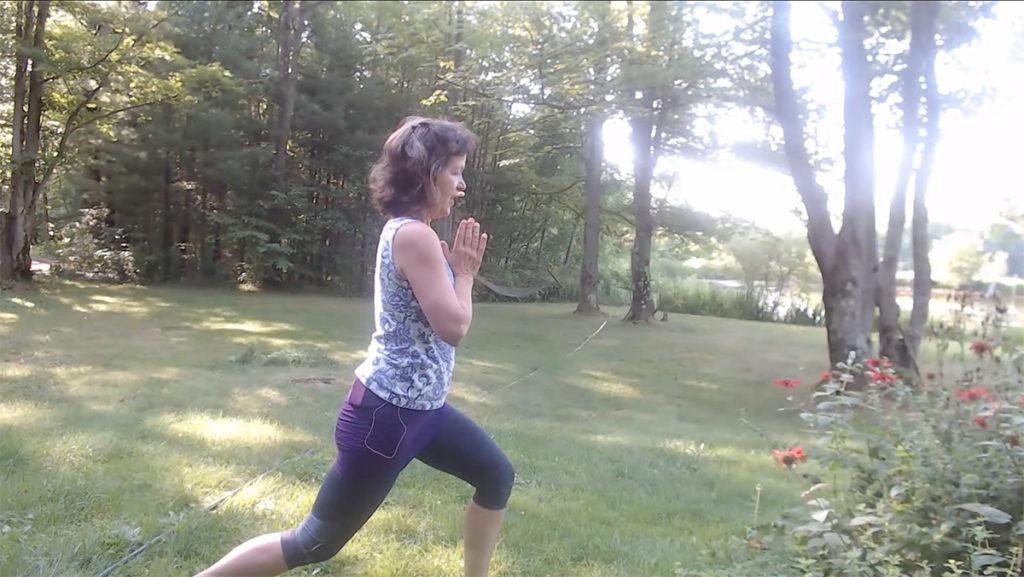“Before we get started, just check in with yourself,” Anne Stork said as she began a qi gong warmup from the comfort of her quaint and compact Ithaca College office. “Just see what you notice about your breath.”
Stork, assistant professor in the Department of Environmental Studies and Sciences, has been partaking in the centuries-old Chinese practice of qi gong for years. Qi gong is a system of movements that focuses on individuals’ breathing and mindfulness and has roots related to tai chi and yoga. Initially, Stork came across this meditationlike practice to get relief from migraines.
“[Qi gong] just hit me deep,” Stork said. “I fell in love with it instantly and, oddly enough, instantly knew I wanted to teach it.”
Stork completed qi gong instructor Lee Holden’s 200-hour teacher certification program online this year and has established herself as a leader of qi gong within the college community. In Spring 2019, Stork began guiding qi gong sessions during the noon hour every Thursday in Muller Chapel. On average, Stork said that approximately eight students would practice with her in the chapel. Some of the attendees were students who had met Stork through a class, and others joined because of their interest in the practice.
Since the college’s transition to remote learning, Stork has continued instructing via Zoom, YouTube Live and through socially distant practices in Stewart Park, where Stork said she has approximately nine attendees.
Ithaca Morning Movement, a YouTube channel, was created at the start of the pandemic and includes Stork and other professionals in the mindfulness fields leading qi gong sessions. Sadie Hays, an acupuncture and herbal medicine expert, created the channel in light of her business, Sadie Hays, L.Ac., closing at the start of the pandemic.
“It seemed to me like one of the ways that I wanted to help my people was to just share movement practices,” Hays said. “To me, there’s like the preventative foundations for good self-care.”
Hays said that the team behind Ithaca Morning Movement posted videos regularly for eight weeks. However, once businesses in Ithaca began to reopen amid the pandemic, the group slowed its production, leaving Stork as the primary contributor to the channel.
“I’m not surprised that she has continued with [teaching online] because of her intention for [continuous] teaching,” Hays said. “It’s so clear and for reaching people, wherever they are.”
Stork’s sessions typically last about 30 minutes, with Stork guiding viewers through gentle movements that focus on breathing. Many of the videos address letting go of tension and anxiety. As she moves, she reads quotes and explains the philosophy behind qi gong.
Senior Julia Cohen began participating in qi gong with Stork after stumbling upon a session in the chapel. Cohen joined some of the virtual and socially distant practices, where she learned the health benefits of qi gong from Stork.
“She’ll be talking about, specifically with the coronavirus, knocking on the door of life, about how it’s healthy for lung health and how this can help build your immunity and prevent illnesses,” Cohen said. “It’s kind of interconnected to other parts of your life as well.”
The COVID-19 pandemic is taking a toll on not only people’s physical health but mental health as well, according to the Centers for Disease Control and Prevention (CDC). The CDC has suggested meditation and exercise to cope with the stressors that come along with the pandemic.
Studies have shown that qi gong has health benefits, including cardiopulmonary fitness, physical function, balance and general quality of life, as well as benefiting individuals with anxiety and depression.
Now, joined by students, family and friends from around the globe on Stork’s YouTube Live practices and Zoom meetings, Stork said that she feels the craft is more accessible.
“You can fit it into your life easier because all you have to do is pull up your phone and log in and you’re there, wherever you are,” Stork said. “The downside is there’s that connection that happens when we are in the presence of others.”
In addition to her extended reach with virtual practice, Stork has also been able to tend to her students’ emotional needs via Zoom. Senior Jamie Osman has been tuning in since the transition to virtual learning.
“I think it was about a month ago, I was very anxious, and I was actually the only one there with her, so she did a specific qi gong practice just for me to help with anxiety,” Osman said.
Senior Adelia Alexander said that Stork would teach using qi gong breaks during her “Introduction to Environmental Science and Technology” class.
“I think with qi gong, she’s very intentional in the way she sets up what she’s going to do,” Alexander said. “I think also in the classroom, she’s very intentional with assignments and the order of things.”
Stork said her qi gong journey continues to evolve every day, bringing her more in touch with herself.
“What is important to me about qi gong is that when you practice, there’s two parts that are the most important,” she said. “One is attention, where you put your attention, and the other is what your intention is. That attention and intention are super powerful, and I think they’re potentially life changing.”














